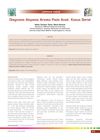 July 2008 in “Expert Review of Dermatology”
July 2008 in “Expert Review of Dermatology” Proper planning for hair transplants is crucial for natural results, with careful patient selection and strategic graft placement being key factors.
 January 2020 in “Journal of Cosmetics, Dermatological Sciences and Applications”
January 2020 in “Journal of Cosmetics, Dermatological Sciences and Applications” DEEPLY ROOTED® supplement seems to effectively improve hair growth and quality in women with no side effects.
 20 citations,
April 2011 in “British Journal of Dermatology”
20 citations,
April 2011 in “British Journal of Dermatology” Reflectance confocal microscopy can tell apart white dots on the scalp as either sweat gland ducts or hair follicle openings.
 20 citations,
January 2009 in “International Journal of Dermatology”
20 citations,
January 2009 in “International Journal of Dermatology” Hair loss in Clouston's syndrome improved with minoxidil and tretinoin treatment.
 3 citations,
January 2018 in “İstanbul Kuzey Klinikleri”
3 citations,
January 2018 in “İstanbul Kuzey Klinikleri” Hair loss was found in 37.4% of surveyed rural high-school students in Eskisehir, Turkey, affecting their quality of life, especially in general health and mental well-being.
 27 citations,
January 2005 in “American Journal of Clinical Dermatology”
27 citations,
January 2005 in “American Journal of Clinical Dermatology” Azelaic acid and anthralin are similarly effective for treating patchy hair loss.
 28 citations,
October 2007 in “PubMed”
28 citations,
October 2007 in “PubMed” Low iron levels are linked to more hair loss in non-menopausal women.
 5 citations,
September 2015 in “PubMed”
5 citations,
September 2015 in “PubMed” New treatments for progressive hair loss in aging men are being developed, including targeted medical therapies, light therapy, plasma injections, and robotic hair transplantation.
 97 citations,
September 2006 in “Pharmaceutical Research”
97 citations,
September 2006 in “Pharmaceutical Research” No treatment fully prevents hair loss from chemotherapy yet.

Two nutritional supplements improved hair growth and reduced hair loss in women with hair loss conditions.
 36 citations,
December 2016 in “Journal of The American Academy of Dermatology”
36 citations,
December 2016 in “Journal of The American Academy of Dermatology” The normal range for the hair pull test is 2 hairs or fewer, and washing or brushing hair before the test does not affect the results.
 January 2025 in “Scholars Journal of Medical Case Reports”
January 2025 in “Scholars Journal of Medical Case Reports” Quetiapine may cause hair loss.
 3 citations,
February 2013 in “Bangladesh Journal of Medicine”
3 citations,
February 2013 in “Bangladesh Journal of Medicine” Low iron levels are linked to hair loss in women.
 34 citations,
July 1999 in “Journal of The European Academy of Dermatology and Venereology”
34 citations,
July 1999 in “Journal of The European Academy of Dermatology and Venereology” Iron deficiency is not a significant cause of hair loss in women.
 19 citations,
November 2012 in “British Journal of Dermatology”
19 citations,
November 2012 in “British Journal of Dermatology” Dopamine stops hair growth and pigment production in human scalp hair follicles.
 3 citations,
November 2020 in “Biological Trace Element Research”
3 citations,
November 2020 in “Biological Trace Element Research” Men with hair loss may lack zinc, copper, and vitamin D; supplements could help.
February 2022 in “Actas dermo-sifiliográficas/Actas dermo-sifiliográficas” Hair shaft disorders, often due to genetics or environment, lack specific treatments but can be managed with gentle hair care and may improve with age or topical treatments.
 17 citations,
April 1997 in “Archives of dermatology”
17 citations,
April 1997 in “Archives of dermatology” The document describes a treatment for excessive hair growth in a teenage girl using medication and birth control, but does not report the results.
 38 citations,
July 2021 in “ACS Nano”
38 citations,
July 2021 in “ACS Nano” Microneedles help treat hair loss by improving hair surroundings and promoting growth.
 January 2011 in “Springer eBooks”
January 2011 in “Springer eBooks” Eating a balanced diet with the right vitamins and minerals is important for healthy hair, but too many supplements can be harmful.
 53 citations,
March 2014 in “Cold Spring Harbor Perspectives in Medicine”
53 citations,
March 2014 in “Cold Spring Harbor Perspectives in Medicine” The document explains different types of hair loss, their causes, and treatments, and suggests future research areas.
 22 citations,
November 2007 in “Journal of Investigative Dermatology Symposium Proceedings”
22 citations,
November 2007 in “Journal of Investigative Dermatology Symposium Proceedings” Hair growth and health are influenced by stress and hormones.
 81 citations,
October 2014 in “The journal of investigative dermatology/Journal of investigative dermatology”
81 citations,
October 2014 in “The journal of investigative dermatology/Journal of investigative dermatology” Certain genes control the color of human hair by affecting pigment production.
60 citations,
October 2020 in “Journal of Controlled Release” Curcumin nanocrystals in simple gels effectively penetrate hair follicles, but humectants can reduce this efficacy.
 September 2010 in “Advances in Dermatology and Allergology/Postępy Dermatologii i Alergologii”
September 2010 in “Advances in Dermatology and Allergology/Postępy Dermatologii i Alergologii” TrichoScan is reliable for counting and measuring hair density but may not accurately assess hair types in women with hair loss.
 April 2022 in “Cermin Dunia Kedokteran”
April 2022 in “Cermin Dunia Kedokteran” Accurate diagnosis and understanding of alopecia areata in children are crucial for proper treatment.
 February 2024 in “PloS one”
February 2024 in “PloS one” Nutraceuticals that promote hair growth do not reduce tamoxifen's effectiveness in breast cancer treatment.
 61 citations,
July 2011 in “PLOS ONE”
61 citations,
July 2011 in “PLOS ONE” Spermidine may help reduce hair loss and deserves further testing as a treatment.
 January 2022 in “Open Access Macedonian Journal of Medical Sciences”
January 2022 in “Open Access Macedonian Journal of Medical Sciences” A 5-year-old boy with alopecia totalis had temporary hair regrowth with treatment but relapsed, highlighting the need for thorough investigation and holistic care.
 November 2024 in “Journal of Natural Remedies”
November 2024 in “Journal of Natural Remedies” Herbal ingredients can effectively promote hair growth and improve hair health.




























